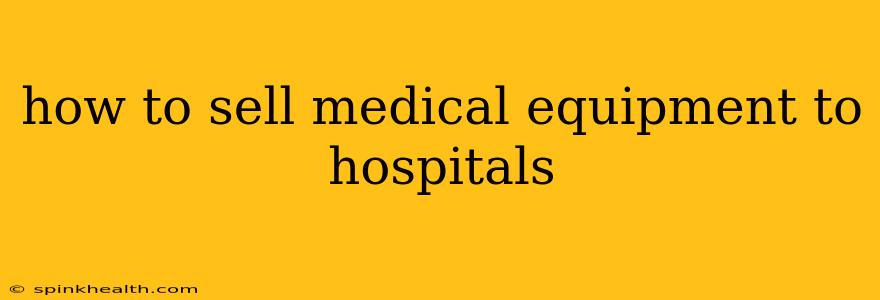How to Sell Medical Equipment to Hospitals: A Journey from Prospecting to Partnership
Selling medical equipment to hospitals isn't a sprint; it's a marathon. It requires persistence, a deep understanding of the healthcare landscape, and a genuine commitment to improving patient care. This isn't just about closing a deal; it's about building long-term relationships with hospitals and their teams.
My journey into medical equipment sales began with a simple observation: hospitals need reliable, cutting-edge technology to provide the best possible care. This realization fueled my passion, and what followed was a steep learning curve, filled with both triumphs and setbacks. I learned that successfully selling medical equipment demands more than just a strong product; it's about building trust, navigating complex procurement processes, and demonstrating the true value your equipment brings.
Let's embark on this journey together, exploring the key strategies that will help you navigate the complexities of this specialized market.
1. Understanding the Hospital's Needs: More Than Just Specs
Before even thinking about a sales pitch, you need to understand the hospital's unique needs. This isn't simply about reading their brochures or website; it's about deep research and genuine engagement.
- What are their current challenges? Are they struggling with outdated technology? Do they lack specific equipment in high demand? Are they focused on improving efficiency or patient outcomes in a particular area?
- Who are the key decision-makers? This goes beyond the purchasing department. You need to identify the clinicians, administrators, and finance professionals who influence the buying process. Networking within the hospital system is vital. Attending industry conferences and joining relevant professional organizations can significantly expand your network.
- What are their budgetary constraints? Hospitals operate under tight budgets. Understanding their financial limitations will help you tailor your proposals and payment options.
2. Building Relationships: Trust is Paramount
Selling medical equipment isn't about a quick sale; it's about fostering long-term relationships. Trust is the foundation of any successful partnership in the healthcare sector.
- Become a trusted advisor: Don't just sell a product; offer solutions. Demonstrate your expertise in the field and your commitment to the hospital's success. Provide valuable insights, even if it means recommending a competitor's product if it's better suited to their needs. This level of integrity earns respect and builds trust.
- Network strategically: Attend industry events, join professional organizations, and actively engage with hospital staff. These interactions create opportunities to build rapport and learn about potential needs before they even become formal requests for proposals (RFPs).
- Excellent Customer Service: After the sale, your work doesn't end. Providing prompt and efficient after-sales service is crucial for building strong relationships and securing repeat business.
3. Navigating the Complex Procurement Process
Hospitals have rigorous procurement processes designed to ensure transparency and accountability. Understanding these processes is crucial for success.
- RFPs and bids: Be prepared to respond to RFPs thoroughly and competitively. Your bid should clearly outline the value proposition of your equipment, its features, and its cost-effectiveness.
- Regulatory compliance: Ensure your equipment meets all relevant safety and regulatory standards. This is non-negotiable in the healthcare industry.
- Negotiation: Be prepared to negotiate pricing and payment terms. A flexible approach can be vital in securing a deal.
4. Demonstrating Value: Beyond the Price Tag
The price is important, but it's not the only factor hospitals consider. You need to demonstrate the value your equipment brings.
- Return on Investment (ROI): Quantify the benefits of your equipment. How will it improve patient outcomes, increase efficiency, or reduce costs in the long run?
- Clinical effectiveness: Provide data and evidence demonstrating the effectiveness of your equipment in clinical settings.
- Training and support: Offer comprehensive training and ongoing support to ensure the hospital staff can effectively use your equipment.
5. Addressing Common Concerns
H2: What are the common challenges in selling medical equipment to hospitals?
The healthcare industry is highly regulated, and hospitals are cautious about adopting new technologies. Common challenges include navigating complex procurement processes, demonstrating ROI, and building trust with hospital staff. Competition is also fierce, with numerous established players and new entrants vying for market share.
H2: What is the average sales cycle for medical equipment?
The sales cycle for medical equipment can be quite long, often spanning several months or even years. This is due to the extensive due diligence and approval processes involved.
H2: How can I improve my chances of closing a deal?
Building strong relationships, understanding the hospital's needs, and demonstrating the value of your equipment are key to improving your chances of closing a deal. Being responsive, providing excellent customer service, and offering flexible payment options can also make a difference.
H2: What are the legal and regulatory aspects I should be aware of?
You must adhere to all relevant FDA regulations and comply with hospital policies regarding procurement and purchasing. This includes demonstrating safety and effectiveness of the equipment.
Selling medical equipment to hospitals is a challenging but rewarding pursuit. It's a process that requires patience, persistence, and a deep understanding of the unique needs and challenges of the healthcare industry. By focusing on building relationships, demonstrating value, and navigating the complexities of the procurement process, you can increase your chances of success and make a real difference in the lives of patients.

